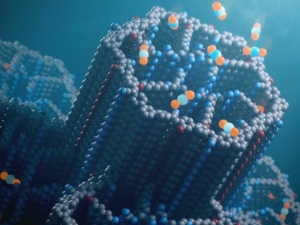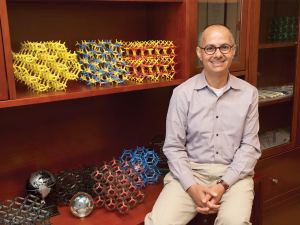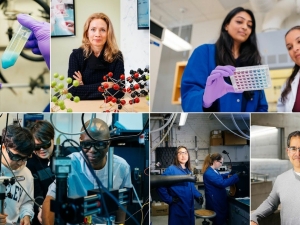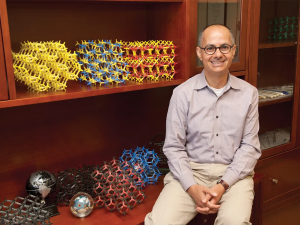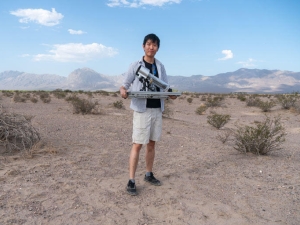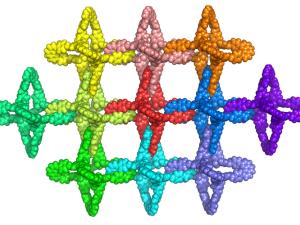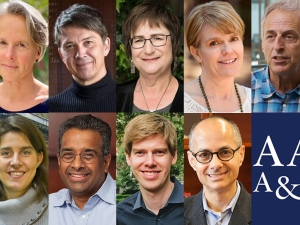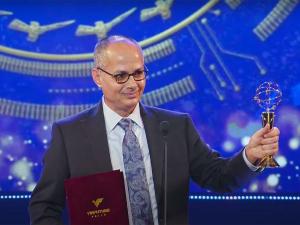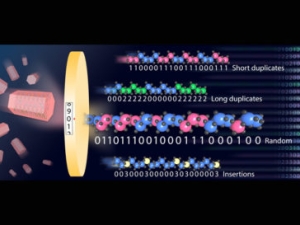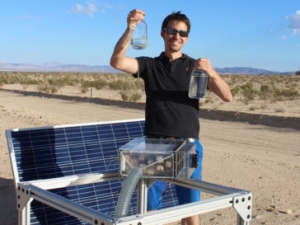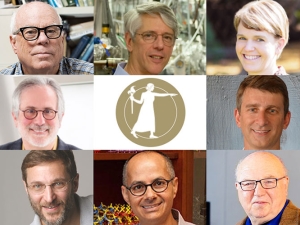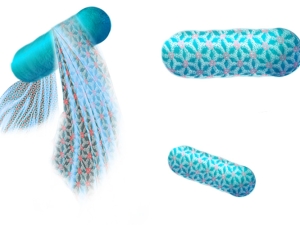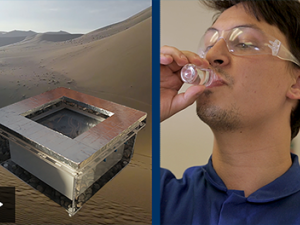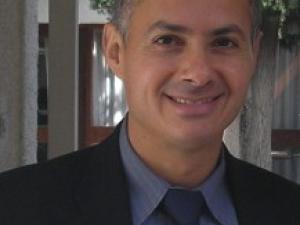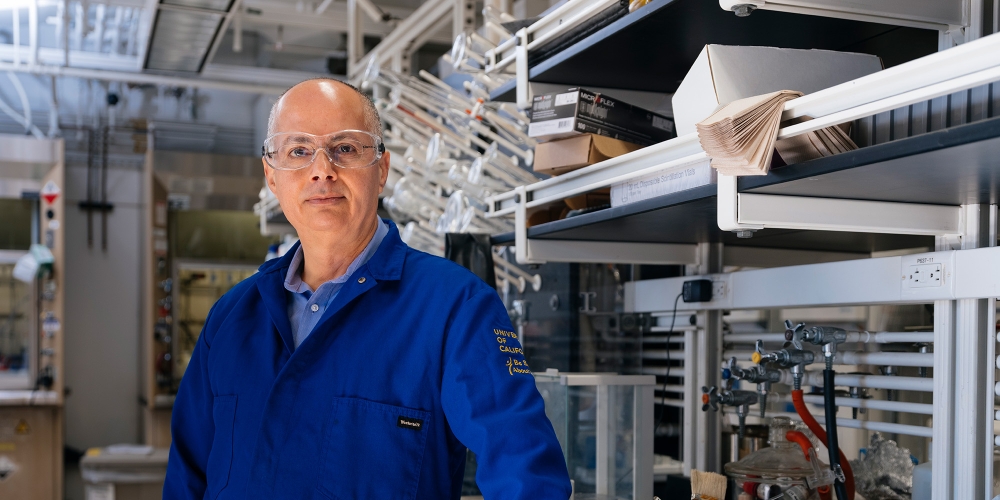

Research Bio
Professor Yaghi is widely known for pioneering metal-organic frameworks (MOFs) and covalent organic frameworks (COFs). These materials have the highest surface areas known to date, making them useful for hydrogen and methane storage, carbon capture and conversion, water harvesting from desert air, and catalysis, to mention a few. The chemistry approach he developed has led to an exponential growth in the creation of new materials. He termed this field 'Reticular Chemistry' and defines it as 'stitching molecular building blocks into extended structures by strong bonds'. He has published over 300 peer-reviewed articles on MOFs and COFs, which have received a total of more than 250,000 citations. He has an h-index of 190 and ranked as the second most impactful chemist worldwide (Top 100 Chemists, Thomson Reuters, 2011).
Specifically, Yaghi reported in 1995 the synthesis and crystallization of the first metal-organic frameworks in which metal ions are joined by charged organic linkers (carboxylates). The strong metal-carboxylate bonds provided for (1) an architecturally robust framework and permanent porosity as he showed in 1998, and (2) metal-carboxylate clusters, termed secondary building units (SBUs), that he used in 1999 as anchors to build MOF-5 having an exceptionally high porosity (2900 m2/g). This value far exceeded the record held by other porous solids. Yaghi used his strong bond, SBU approach to report MOF-177 in 2004 and MOF-210 in 2010 with even higher record-breaking porosities (4,500 and 10,400 m2/g, respectively). His approach was also critical in achieving MOFs with 10 nm pore sizes, the largest of any porous crystal. In 2005, Yaghi showed how organic molecules can be linked by covalent bonds to make the all organic 2D covalent organic frameworks (COFs) and in 2007 extended his strategy to 3D COFs, where crystals of a member of this family, COF-108, has an ultra-porous structure, making it the least dense material known. Ultra-porous MOFs and COFs became the basis of what is being used now for their numerous utilities in gas storage and separations. The strong bonds holding MOFs and COFs allow their use over thousands of cycles and longevity in industrial applications.
Professor Yaghi's invention of MOFs and COFs is helping to achieve cleaner air, cleaner energy, and cleaner water. Yaghi’s pioneering work on carbon dioxide capture and hydrogen storage with MOFs and COFs opened the door for achieving “net zero emissions” in the future. His creative development of using MOFs and COFs to harvest water from desert air is an excellent example how a chemist can break the traditional disciplinary boundaries and take a laboratory basic science observation all the way to society. His group designed several prototypes and showed that these MOF water harvesters work well in some of the driest deserts in the world (Arizona and the Mojavi deserts). His MOF water harvester has been demonstrated and has the potential to provide clean water anywhere at any time of the year and ultimately give people water independence. Yaghi’s MOF water harvesting technology has been showcased at the 2017 World Economic Forum as one of the top ten emerging technologies to change the world. IUPAC in 2019 also named Yaghi’s MOF water harvesting one of the top 10 breakthroughs in chemistry.
Yaghi is an elected member of the U.S. National Academy of Sciences (2019) and the German National Academy of Sciences Leopoldina (2022). He has also been honored with many awards, including the Sacconi Medal of the Italian Chemical Society (2004), Materials Research Society Medal (2007), American Chemical Society Award in the Chemistry of Materials (2009), Royal Society of Chemistry Centenary Prize (2010), King Faisal International Prize in Science (2015), Albert Einstein World Award of Science (2017), BBVA Foundation Frontiers of Knowledge Award in Basic Sciences (2017), Wolf Prize in Chemistry (2018), Eni Award for Excellence in Energy (2018), Gregori Aminoff Prize by the Royal Swedish Academy of Sciences (2019), August-Wilhelm-von-Hofmann-Denkmünze of the German Chemical Society (2020), Royal Society of Chemistry Sustainable Water Award (2020), VinFuture Prize for Emerging Science and Technology (2021), Wilhelm Exner Medal (2023), Solvay Prize (2024), Tang Prize (2024), and Balzan Prize (2024).
Research Expertise and Interest
Reticular Chemistry, metal-organic frameworks, covalent organic frameworks, Carbon Capture, gas storage systems, water harvesting from desert air
In the News
Capturing Carbon From the Air Just Got Easier
Omar Yaghi Wins Prestigious Tang Prize for Sustainable Development
Berkeley’s Ecosystem of Innovation, Entrepreneurship Combats Climate Change
Chemist Omar Yaghi Wins Solvay Prize for Climate, Materials Breakthroughs
Can ChatGPT Transform Science? Chemists Say Yes.
ChatGPT Accelerates Chemistry Discovery for Climate Response, Study Shows
New ‘Chain Mail’ Material of Interlocking Molecules is Tough, Flexible and Easy to Make
New Institute Brings Together Chemistry and Machine Learning to Tackle Climate Change
Nine Faculty Members Elected to American Academy of Arts & Sciences
Omar Yaghi Awarded the Inaugural VinFuture Special Prize
Programmable synthetic materials
Water harvester makes it easy to quench your thirst in the desert
Eight Berkeley faculty elected to National Academy of Sciences
‘Spacesuits’ protect microbes destined to live in space
In desert trials, next-generation water harvester delivers fresh water from air
Omar Yaghi to Direct Berkeley Lab’s Molecular Foundry
Omar Yaghi, one of the world’s most cited chemists and leading authorities on nanoscience, is the new director of the Molecular Foundry, a U.S. Department of Energy nanoscience center at Berkeley Lab.
Featured in the Media
Deployed at scale, the material could significantly reduce the amount of carbon in the atmosphere in a way no other technology can, said Omar Yaghi, professor of chemistry and lead author of a paper announcing the material's discovery.
“You can harvest water from air anywhere in the world, at any time of the year regardless of the level of humidity, without a carbon footprint,” says chemistry Professor Omar Yaghi, who founded Atoco in 2021. Yaghi and Atoco have previously been featured on UC Berkeley News.
Water-absorbing compounds called metal–organic frameworks — developed in the lab of Chemistry Professor Omar Yaghi — could be part of a future in which any house with electricity could reliably address its drinking-water needs with an appliance roughly the size of a microwave oven.
A new version of a water harvester that can pull water from air, even in desert conditions, is 10 times better than an earlier version and is headed for market. A team of scientists led by chemistry professor Omar Yaghi developed the device, which uses a water-absorbing material called a metal-organic framework, or MOF, to reliably produce more than five cups, or 1.3 liters, of water per day per kilogram of MOF. That amount of water is more than required for one person to stay alive. "We are making ultra-pure water, which potentially can be made widely available without connection to the water grid," Professor Yaghi says. "This water mobility is not only critical to those suffering from water stress, but also makes possible the larger objective -- that water should be a human right." Professor Yaghi's startup, Water Harvester Inc., is testing and will soon begin marketing a harvester that can supply 7 to 10 liters of water a day -- enough for two to three adults. For more on this, see our press release at Berkeley News. Stories on this topic appeared in dozens of sources around the world, including Centre Daily Times and Technology Networks.

